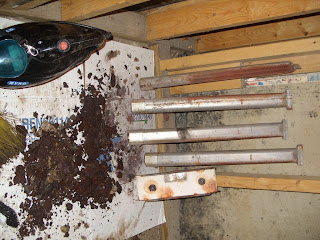Sunday, September 26, 2010
The Long Living Boiler
Jeff Bishop had to flush out the boiler and radiators today. The person who soldered the pipes for the HW heater did a messy job. The sweating was unprofessional. So Jeff came to provide advice.
Jeff came in and flushed the pipes for the boiler. This boiler is likely 25-30 years old. Few contractors understand hot water heat. They can lat 50 years with proper controls and maintenance.
A major drawback is that central air conditioning cannot be installed without a seperate air handler and ductwork which is a huge expense. Ultimately these factors should be reflected in the value of the home. Central air conditioning is almost a given in 2007 where it didn't exist in 1955.
A water boiler feeds radiators as opposed to the boiler that heats air.
Not staying cherry red. When gas hits it it lights. Jeff did find out there was a problem with the thermocouple (which costs less than $10). Then he realized that it was the valve.
Next he had to flush out the radiators. He charged $300 for the flush and another $300 for the repair.
Subscribe to:
Post Comments (Atom)



I have viewed your pictures and video and will say they are well done. The problem however, it is my opinion that by the pictures and video I saw, this boiler should have been replaced a while ago. We respectfully cannot service a boiler in this condition. When a Hydrotherm starts to show the burn on the front and the burners look like this, this boiler would be considered questionable at best. The boiler has been exposed to moisture by the signs of the rust on the controls and also on the right. This in itself will kill a boiler causing the moisture to condensate inside the jacket and on the cast iron. I cannot tell where the moisture is from, but seeing the water on the floor, and all the rust on the pipes, if the water is from the floor, this boiler should have been installed at least 4-6” above the floor.
ReplyDeleteI do have some questions, with one being, why did you “flush out the pipes”? Boiler water becomes heavy and dark as it picks up the iron oxide from the system; however there is nothing wrong with this. Installing new water just adds dissolved oxygen again to the system that must be bled out through the radiators. Also by adding new water, sometimes you remove a coating inside the system that may cause the boiler or piping to leak. Another item that I am not sure you have addresses that can also cause moisture is the condition of your chimney. Have you had that checked and certified safe? Many older homes in DC do not have liners in the flue, and this is no longer acceptable by code.
Please be sure that you have a “Best” CO detector on every floor of your home to be sure that the boiler and or any other gas device is burning properly.